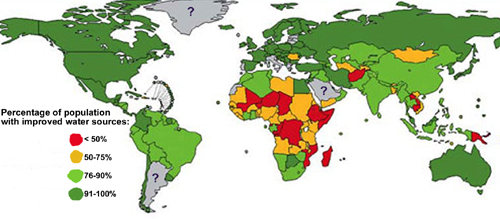
We take so much for granted and nothing more necessary to almost every aspect of our lives than potable water. That may be one of Africa’s top problems, if not the single-most urgent need.
All of us who’ve traveled Africa love the picturesque image of a colorfully dressed African woman balancing an equally colorful bucket of water on her head. There must be a thousand million paintings and drawings of this image.
But it is an image we ought not covet. It’s an image of egregious want.
According to Unesco one billion people lack access to improved water supply, the vast majority in Africa. Less than a quarter of the households in Africa have piped water supplies, and only about an eighth of the households in Africa are linked to a sewage system.
This week two completely separate events – one an individual judicial action in Botswana and the other a continent-wide political fight in Uganda – underscore the difficulties Africa is facing obtaining water for its citizens.
At the OAU Conference currently being held in Kampala, Egypt and The Sudan are fighting an East African coalition of countries over use of the Nile.
Egypt could not survive without its hoarding of the waters of the Nile. It is otherwise a desert. Today, there is not a single drop of water entering the Mediterranean from what was once the great Nile outflow. It is dry. Dust. Egypt needs more. More for people’s daily needs and more for growing food.
Prior to giving independence to a number of countries earlier last century, the colonial master, Britain, forced its soon-to-be-freed colonies in East Africa to agree that Egypt and The Sudan would control the Nile.
That 1959 treaty is now coming under fire at the OAU. Uganda, which controls the outflow of the White Nile mostly from Lake Victoria, and Ethiopia, which controls the outflow of the Blue Nile mostly from Lake Tana, have indicated they will abrogate the treaty.
And Kenya and Tanzania, which control large portions of Lake Victoria, have indicated they may do so as well.
East Africa needs lots of water. At the height of the recent drought, more than 5 million Nairobi area residents went on water rationing that averaged running water only every other day. According to East Africa’s Flying Doctors 70% of all the hospital visits in East Africa are caused by contaminated water.
And East Africans point out that the massive Aswan Dam (which Britain opposed being built, but long after having any influence in the region) loses nearly a fifth of all the Nile’s water to evaporation.
The solution presented at the OAU conference by Egypt and The Sudan is terrifying. Egypt is offering to build a canal around the huge Nile wetland known as the Sudd in The Sudan, which would direct Lake Victoria Waters directly into the Nile basin.
This is a temporary solution that could increase the Nile’s output by nearly 50%. But it will drain the Sudd, Africa’s largest wetland. The long-term consequences are mind blowing. We all know the incredible, devastating impact that draining wetlands has on any environment.
But the question is: potable water, now, for people; or a wetland for the future? The East African countries seem ready to accept the Egyptian proposal.
And at the other end of the continent, this week a judge in Botswana ruled that indigenous Bushmen would not be allowed to drill boreholes in their reserve to obtain potable water.
The argument is that in the reserve, as in similar places in Africa (like the Ngorongoro Conservation Area in Tanzania) the Bushmen have been given the right to pursue traditional life styles, but cannot modernize. Drilling a well is modernizing.
But modern Bushmen organizations are arguing that their life needs are paramount, and that denying water in a global climate changing world is a ruthless mandate, especially when Botswana’s meager water sources are being used by country clubs in Gaborone and diamond mines in the Kalahari, the Bushman’s traditional home.
Africa is replete with crises. But there seems none as urgent as this, yet with solutions as evanescent as an evaporating mist.
Jim , since China is stealing all their oil why don’t you tell East Africa to demand that every Chinese commissioned tanker return with and deliver and equal amount water. Bud Davis